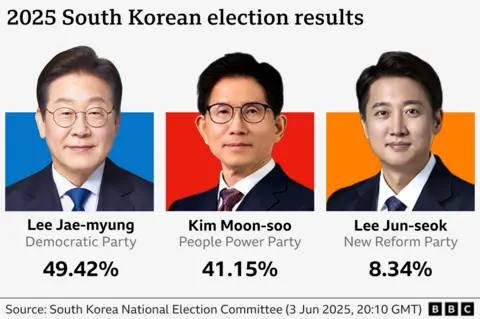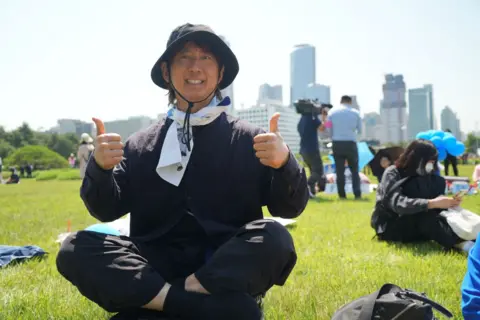South Korea's new president Lee Jae-myung pledges to 'unite' country
 Getty Images
Getty ImagesJust hours after winning the South Korean presidency, Lee Jae-myung has pledged to "unite the people" in his inauguration speech on Wednesday.
The 61-year-old won a snap election by 49.4% - a clear rejection of his rival, Kim Moon-soo, who came from the same party as impeached president Yoon Suk Yeol.
Yoon triggered months of political chaos after he attempted to impose martial law, which eventually resulted in his impeachment.
As he takes on the top job, Lee now faces the daunting task of not only uniting the country, but also balancing ties with its most important ally, the US, under President Trump's unpredictable brand of diplomacy.

In a clear reference to his predecessor, the Democratic Party's Lee said in his address that he would "never again" allow democratic institutions to be threatened, adding that he would "become a president who ends the politics of division".
Speaking to a crowd in front of parliament - where just over six months ago he jumped over the perimeter wall to vote down Yoon's martial law declaration - Lee blamed the country's political turmoil on "political factions with no desire to work for the lives of the people".
He also pledged to build a "flexible, pragmatic government" and announced that an emergency economic task force would be "activated immediately".
It's a remarkable comeback for a man who has been caught in several political scandals, from investigations over alleged corruption to family feuds - though analysts and officials say his win was a clear capitalisation of public anger.
"The people judged the December 3 martial law [incident] as a violation of democracy," National Assembly Speaker Woo Won-shik told BBC Korean in an exclusive interview.
"This election was not only a judgment on that, but also a reflection of the public's demand to properly restore democratic principles."
Woo said the result was "a fair reflection of the will of the people" and "clearly expressed the people's intent".
This was echoed by Park Sung-min, president of Min Consulting, who said voters were not "necessarily expressing strong support for Lee's agenda - rather, they were responding to what they saw as a breakdown of democracy".
"The election became a vehicle for expressing outrage... [and] was a clear rebuke of the ruling party, which had been complicit in or directly responsible for the martial law measures," he said.
Dozens of Lee supporters gathered in front of parliament on Wednesday, hoping to catch a glimpse of the president - with many saying they were excited to see what he would achieve.
"I'm so happy he was elected - I stayed here all night in order to see the inauguration ceremony," Leo Kil, a software engineer, told the BBC.
"I believe he will carry out his basic promises, like creating a fair world. I hope South Korea becomes a country where people who commit wrongs receive the consequences of the law and laws are enforced as promised with the people. I have really high expectations."
 BBC/Hosu Lee
BBC/Hosu LeeYoo Gi-won, another Lee supporter, said that "Yoon's presidency made me feel like the country is going to be ruined. I saw everyone around me suffering".
"For a while South Korea has been cold place [but now] I'm so, so happy," he added.
But as the fanfare fades, Lee will be left facing a daunting reality.
For one, he is still facing a trial in the Supreme Court over charges of violating election laws. The court postponed the trial until after the election to avoid interference, as a conviction could have barred Lee from contesting.
It's not clear what happens if Lee is now found guilty, though the law says sitting presidents cannot be prosecuted for criminal offences, with the exception of insurrection or treason.
Greater still is his challenge of bringing together a nation that is still racked by deep anger and division.
"Years of escalating polarisation under both the [previous] Moon and Yoon administrations have left South Korea's political landscape bitterly divided," Mr Park said.
"Lee may speak of national unity, but he faces a profound dilemma: how to pursue accountability for what many view as an attempted insurrection without deepening the very divisions he seeks to heal."
Despite the PPP's loss, ex-President Yoon still has a considerably strong and vocal support base - and it is unlikely to go away anytime soon.
His supporters, mainly young male voters and the elderly, often push strong right-wing narratives, and many of them believe his declaration of martial law was necessary to protect the country.
Many also peddle conspiracy theories, believing Yoon's party was a victim of election fraud.
With Yoon gone, there are questions about who might fill the vacuum for this predominantly young, male base.
One name in particular has emerged: Lee Jun Seok, who also ran for president, but dropped out earlier on Tuesday when exit polls suggested he was trailing too far behind.
He has been especially popular with many young men for his anti-feminist views, which has reminded some of Yoon, under whom equality for women became a polarising subject.
Young men in their 30s came out in higher numbers than usual to vote this time, drawn in part by candidates like Lee Jun-seok.
Those wanting to hold the PPP-led government accountable, as well as others wanting to ensure Lee Jae-myung's presidency was dashed, led to this year's voter turnout reaching 79.4% - the highest since 1997.
And so it is in this political climate that Lee takes over - hoping to transform public fury into hope.
How - and if - he might do that, is a question that will be closely watched.
Additional reporting by Woongbee Lee, Richard Kim and Haeryun Kang
